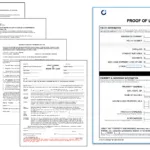Filing a homeowners or property insurance claim is daunting. It’s not something you do every day, and there are all kinds of state laws and regulations, not to mention the complicated terms of the policy itself. Even so, there is some good news for policyholders. Insurance is highly regulated, and there are many regulations designed to provide protection to policyholders. And, if policyholders understand and use the protections, they should have a smooth, fast, efficient, and fair insurance claim process.
These resources are built to help policyholders — and all the stakeholders who work with them, like adjusters, attorneys, contractors, and consultants. These resources will help you file your claim correctly and on time, document your losses properly, followup through the claim process, and to escalate and resolve your claim.
Claim Filing Deadline
Set by Policy
Illinois does not have a specific provision setting forth a universal deadline for making a property insurance claim, and instead allows the deadline for informing the insurer of a claim to be set forth by the policy itself.
Initial Response Time
15 working days
Once an insurer receives a notification of claim from their insured, the insurance company is required to acknowledge the claim within 15 working days.
Claim Decision Time
Reasonable time
Illinois does not have a specific deadline setting forth when the insurer must accept or deny the claim in whole or part, other than to state that the insurance company “shall affirm or deny liability on claims within a reasonable time”
Lawsuit Deadline
10 Years – Unless shortened by policy
Absent a provision in the policy shortening the period, the general deadline to file suit related to a written contract (including a contract of insurance) in Illinois is 10 years. However, Illinois allows parties to a contract to agree in writing (through the policy) to shorten that deadline, as long as the time period is reasonable. This generally occurs in insurance policies.”
State Department
Illinois Department of Insurance
Illinois Department of Insurance
122 S. Michigan Ave, 19th Floor
Chicago, IL 60603
(312) 814-2420
Illinois Dept. Of Insurance Website
File your Claim Now with ClaimSpot
ClaimSpot guides you through a quick, secure, and effortless filing experience.
It’s free. Let ClaimSpot Make Your Claim Fast & Easy.
Illinois Insurance Claim Guide
Filing: Illinois Insurance Claim FAQs
All insurance claims start by informing your insurance company of the loss. You want to do this as soon as possible. There are many ways to notify the insurance company. It’s most important that you keep a record of notifying them. Here are frequently asked questions about how to best “file your claim” with the insurance company in Illinois and the state regulations that will help (or hurt) you!
In order to initiate a claim under a property insurance policy in Illinois, the policyholder only needs to inform their insurance carrier of the loss (either directly or through their insurance agent), and provide the facts pertinent to the claim.
In many cases, an insurance company will call this communication a first notice of loss, or FNOL. In Illinois insurance law, this type of initial communication is called a “notification of a claim”.
While it can help to be as detailed as possible in the first communication with the insurer or agent, Alabama, as noted above, law defines notice of claim as “Any notice or notification . . . to an insurer . . . by a claimant, which reasonably apprises the insurer of the facts pertinent to a claim.”
Usually, there are a few ways by which you can inform your insurance company of the loss, including:
a. Phone call (a number is usually provided on the insurance company’s website);
b. Online portal – many insurance companies have an online form to notify the claims department of a loss;
c. Your agent – many insurance companies even have a different section of their website or phone number for an agent to inform them of a policyholder’s loss;
d. Online software.
While it is easy and quick to start a claim, claimants need to continue to follow-up and provide more information. In many cases, the insurer will require more information and supporting documentation, including specific forms, to actually process and adjust the claim.
1. Promptly inform your insurance carrier of the loss (see above);
2. As soon as possible begin to mitigate the damage – protect the property and secure it against further damage as soon as it is safe and possible to do so.
3. Cooperate with your insurance company and communicate with them (and keep copies of all correspondence).
4. Make your property available for inspection as soon as it is safe and possible to do so.
5. Prepare supporting documents for your claim including:
– Inventory list;
– Description of damages;
– Photographs and/or videos of the damage;
– Receipts; etc.
Reporting Deadline: Illinois insurance law does not have a specific provision setting forth a universally applicable deadline for making a property insurance claim. This means that the deadline for informing the insurer of a claim is set forth by the policy itself. It is important to be familiar with the insurance policy so that deadlines are not missed. Generally, a property insurance policy will require that insured to inform the company of a loss and associated claim within a reasonable period of time.
It is always best practice to inform an insurance company of the losses sustained and that a claim is being made as soon as it is reasonably possible to do so after the damage is incurred and a determination that a claim will be filed is made. While it is never a good idea to delay in providing the insurance company with information once it has been determined that a claim will be filed, the actual meaning of “immediate” or “prompt” or “reasonable” with respect to making a claim depends on the circumstances – if a home is completely destroyed by a storm and the phones, internet, and power are off, it may take a little longer to make the claim.
Be sure to check the language of the insurance policy to determine the notification or reporting deadlines. But, in any event, remember that best practice is to provide notice of the loss and claim to the insurer as soon as possible.
Followup: Document Your Illinois Insurance Claim FAQs
Notifying the insurance company about a loss is just the first step. The most important work comes next: documenting your loss and following up with the carrier. Illinois has enacted specific regulations to guarantee that the insurance company acts in a reasonable and timely manner and moves quickly to investigate and pay your claim…but you need to understand these regulations to get the benefit. That means communicating with the insurance company early and often and putting them on the clock. These FAQs will show you how.
Documentation Deadline: Similarly to the deadline by which a policyholder must make a claim, the deadline to provide supporting documents or other documentation or evidence is not set by Illinois statute, but instead by the policy itself. In many cases, Illinois insurance policies require that a proof of loss document be provided within 30 or 60 days of when the loss was sustained, but this is not a hard and fast rule. In any event, however, the deadline for submitting a proof of loss may be extended by agreement between the parties if circumstances make it difficult or impossible for the policyholder to comply with the deadline as set forth by the policy.
Note, however, that no matter the actual deadline for providing supporting documentation, it is always best practice to provide a proof of loss document and support of the claim as soon as possible (while noting that the document only presents the knowledge at the time and may be amended or updated). Some deadlines for Illinois insurance companies start to run from receipt of a sufficient proof of loss (in connection with any other items or requested forms), so getting one to the insurance company quickly is a good way to get the claim process moving along, and to get your payment. And, the statute of limitations for suing the insurance company, if a suit becomes necessary, is paused from when the proof of loss is provided to when the claim is ultimately denied in full or part.
Deadlines for Acknowledgment: Illinois has adopted laws governing unfair claims settlement practices to protect policyholders and to provide a streamlined timeline for claims to be handled.
Once an insurer receives a notification of claim from their insured, the insurance company is required to acknowledge the claim with “reasonable promptness.” Illinois has defined reasonable promptness in this situation as within 15 working days.
Deadlines for Investigation: Illinois insurers are also required to conduct a “prompt investigation” which has been defined to mean 21 working days.
The insurer is also required to respond to any communication front he insured policyholder within 15 working days of receipt of such communication.
Resolving: Get Paid & Protect Your Rights On Illinois Insurance Claim FAQs
Ultimately, the insurance claim must be approved and paid (or, unfortunately, denied). Getting to this step and getting the money has a lot of logistics…and that is if everything goes well. If all or any portion of the claim is debated (which is really common) then you need to escalate it. In either event, Illinois has regulations governing these timelines to guide the way. These FAQs show what is supposed to happen.
Deadline for Acceptance/Denial: Illinois does not have a specific deadline setting forth when the insurer must accept or deny the claim in whole or part, other than to state that the insurance company “shall affirm or deny liability on claims within a reasonable time” after a proof of loss statement is completed. Unfortunately, unlike “reasonable promptness” with respect to the initial response to the claim above, a “reasonable time” for acceptance or denial of a claim is not defined by Illinois.
Accordingly, Illinois insurance companies set their own internal deadlines for acceptance or denial of claims, and can modify or extend those deadlines as needed to conduct the investigation. Note that, if the claim is denied, the company shall provide a reasonable written explanation of the basis of the denial within 30 days.
Deadline for Payment: Illinois generally requires that any approved portion of a claim must be paid within 30 days of the claim determination.
If an insurance company is determined to be in violation of the unfair claims settlement practices requirements, the insurer is subject to penalties for each instance of noncompliance.
Additionally, the policyholder is allowed to file suit against the insurance company when there is an issue regarding “the liability of a company on a policy or policies of insurance or the amount of the loss payable thereunder, or for an unreasonable delay in settling a claim.” In any such suit, if the actions of the insurance company are determined to be “vexatious and unreasonable” the court may award attorneys’ fees, costs, and an additional amount not to exceed any of the following:
“(a) 60% of the amount which the court or jury finds such party is entitled to recover against the company, exclusive of all costs;
(b) $60,000 ;
(c) the excess of the amount which the court or jury finds such party is entitled to recover, exclusive of costs, over the amount, if any, which the company offered to pay in settlement of the claim prior to the action.”
Further, depending on the actions of the insurance company, a policyholder may be able to make a claim against the insurer for bad faith.
Deadlines to File Suit: Absent a provision in the policy shortening the period, the general deadline to file suit related to a written contract (including a contract of insurance) in Illinois is 10 years. However, Illinois allows parties to a contract to agree in writing (through the policy) to shorten that deadline, as long as the time period is reasonable. This generally occurs in insurance policies.
Additionally, while the deadline generally begins to run from the date the claim occurred (when the claim is denied), Illinois law specifically tolls (pauses) the deadline for the period from when the proof of loss is provided until the claim is denied.












